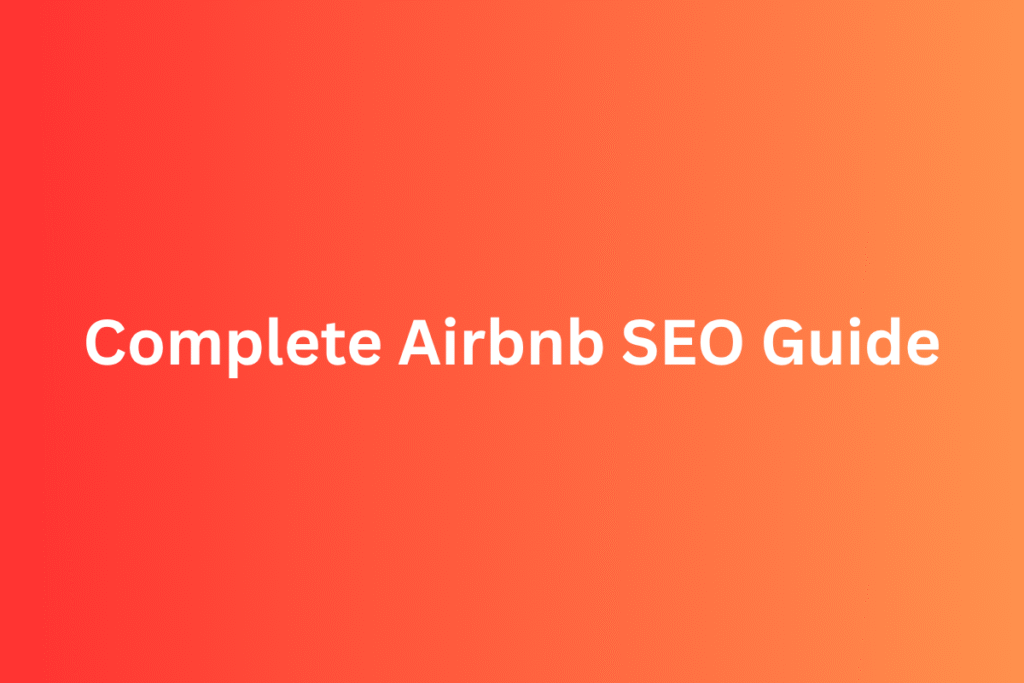If you’re an Airbnb host and not paying attention to SEO, you’re leaving money on the table. Many hosts focus only on great photos or low pricing. But there’s another powerful factor behind successful listings: Airbnb SEO.
When someone searches for a place to stay on Airbnb, the platform doesn’t show listings randomly. There’s an algorithm and with the right strategy, you can move your listing higher up in those results. More visibility = more clicks = more bookings.
In this complete guide, I’ll tell you exactly how Airbnb SEO works, what factors affect your rankings, and most importantly, how to improve your listing step by step.
What is Airbnb SEO?
Airbnb SEO refers to how well your listing is optimized to appear in Airbnb search results when guests search for a stay. The higher your listing ranks, the more likely it is to get views and bookings.
Just like Google uses a search algorithm to show results, Airbnb has its own system to match listings with guest search intent.
How Airbnb’s Search Algorithm Works
Airbnb’s search algorithm is built around user experience and booking potential. It aims to show listings that are:
- Relevant to the search (location, dates, filters)
- Likely to get booked
- Well-rated by previous guests
- Frequently updated and active
It also uses personalization. Two users searching for the same city may see different listings based on their past behavior, budget range, or preferences.
Key Ranking Factors of Airbnb
Let’s break down the key factors that affect your listing’s SEO on Airbnb and how you can improve them:
a. Booking Conversion Rate
This is one of the strongest signals to Airbnb’s search algorithm. If people view your listing and actually book it, Airbnb assumes your property is appealing and relevant. The more bookings per view you get, the higher Airbnb pushes your listing in the search results.
How to improve it:
- Make sure your pricing is competitive.
- Use clear, high-quality photos that set the right expectations.
- Write an honest, attractive description that highlights unique features.
- Enable Instant Book to reduce booking friction.
b. Response Time and Rate
Airbnb wants guests to have a smooth booking experience. Listings from hosts who reply fast and consistently are prioritized because they’re seen as reliable.
How to improve it:
- Aim to respond within 1 hour. Airbnb highlights fast responders.
- Turn on app notifications and email alerts.
- If you’re busy, consider using saved replies or a co-host to help with messages.
c. Review Quality and Quantity
Reviews help Airbnb gauge guest satisfaction. More positive reviews signal that you’re providing a good experience, which boosts your ranking.
How to improve it:
- Provide a clean, comfortable space that matches your listing.
- Offer helpful communication and local tips.
- Ask guests politely after checkout to leave a review.
d. Calendar Availability
Airbnb favors active listings. If your calendar is outdated or blocked for months, Airbnb assumes your place isn’t available or active.
How to improve it:
- Log in and update your calendar frequently.
- Avoid long periods of blackout unless necessary.
- Keep dates flexible during high-demand seasons.
e. Price Competitiveness
Your listing’s price matters. If it’s too high compared to similar listings, guests will skip it. If it’s too low, Airbnb may think something’s wrong.
How to improve it:
- Use Airbnb’s Smart Pricing tool if needed.
- Research nearby listings to benchmark rates.
- Adjust seasonally based on demand.
f. Listing Completeness
Airbnb favors listings that are fully filled out and offer clear, informative details.
How to improve it:
- Write a detailed, keyword-rich title.
- Fill every section of the description thoroughly.
- Upload at least 20 high-quality, well-lit photos.
- List all amenities and features accurately.
g. Guest Experience
Airbnb tracks metrics like cancellation rate, response quality, and guest satisfaction.
How to improve it:
- Avoid cancellations unless absolutely necessary.
- Follow through on your promises in the listing.
- Maintain cleanliness and hospitality standards consistently.
Step-by-Step Airbnb SEO Optimization
Step 1: Write a Keyword-Rich Title
Your title is the first thing potential guests see. It should not just be catchy, but also informative and keyword-optimized. A good title helps Airbnb understand what your property offers and match it to relevant searches.
Tips:
- Include location details (e.g., South Delhi, Near Metro)
- Highlight unique features (e.g., 2BHK, Garden View, Work-Friendly)
- Keep it under 50 characters for best visibility on mobile
Example:
- Bad: “Charming Place”
- Good: “Spacious 2BHK in South Delhi Near Metro”
Step 2: Craft a Strong Description
Your listing description should sell your space while being easy to scan and rich in keywords. It should answer guest questions before they ask.
What to include:
- Unique aspects of your property
- Neighborhood insights (cafes, transport, safety)
- Who the space is ideal for (solo travelers, families, business trips)
- Clear structure with bullet points or short paragraphs
Tip: Use keywords naturally, like “walkable distance to beach,” “quiet residential area,” or “high-speed Wi-Fi.”
Step 3: Upload High-Quality Photos
Photos are often the reason someone clicks your listing or skips it. Airbnb rewards listings that have plenty of clear, bright, and inviting photos.
How to optimize:
- Include at least 20 high-quality photos
- Start with a strong cover photo (exterior or living room)
- Show all major rooms and amenities
- Use daylight for natural lighting
- Avoid cluttered or grainy images
Professional photos improve both search ranking and booking rates.
Step 4: Keep Your Calendar Updated
Airbnb values active hosts. If your calendar looks neglected or outdated, your listing may fall in rankings.
How to improve:
- Log in every few days and adjust availability
- Update calendar even if no changes just to signal activity
- Avoid blocking long periods unless you’re truly unavailable
- Use pricing and availability rules for high demand periods
Step 5: Respond to Every Message Quickly
Airbnb wants guests to feel secure. Fast communication signals you’re a reliable host.
Best practices:
- Aim to respond within an hour
- Use the Airbnb app with notifications enabled
- Set up automated replies for common questions
- Don’t leave inquiries or pre approvals pending
Response time is a direct ranking factor and also affects your chances of becoming a Superhost.
Step 6: Use Smart Pricing (But Stay Competitive)
Dynamic pricing helps you stay attractive in search results, but you still need to make sure you’re offering good value.
Tips to stay competitive:
- Use Airbnb’s Smart Pricing with minimum and maximum limits
- Adjust pricing based on seasons, events, or local demand
- Check competitors with similar listings to compare
- Offer discounts for longer stays or last-minute bookings
Avoid pricing too low—it may reduce perceived quality or too high without justifying the value.
Step 7: Get Reviews Early and Often
Positive reviews are social proof. Airbnb favors listings that consistently deliver a good guest experience.
Tips to earn 5-star reviews:
- Deliver what your listing promises (clean, accurate, well-equipped)
- Be helpful before check-in and available during the stay
- Leave reviews for guests promptly many will reciprocate
- Politely ask for a review after checkout (never pressure)
Consider offering a small welcome gift or personalized message to create a memorable experience.
Step 8: Turn On Instant Book
Listings with Instant Book enabled rank higher because they make it easier for guests to book with confidence.
Why it helps:
- Reduces waiting time for guests
- Improves booking conversion rate
- Signals trust in your listing
Tips for using it wisely:
- Set guest requirements (e.g., verified ID, good reviews)
- Use calendar rules to block prep time between bookings
- Turn it off only when necessary (e.g., during major renovations or personal time)
Conclusion
SEO may sound technical, but on Airbnb, it simply means creating a better experience for both guests and the algorithm. Every time you improve your title, add a new photo, respond quickly, or earn a 5-star review, you’re investing in better visibility and more bookings.
Airbnb wants to reward reliable, active, and high-quality hosts. The good news? That means you can compete even in crowded markets just by following the right steps.
Remember, Airbnb SEO is not about tricks. It’s about consistency, clarity, and care.
Ready to Grow Your Airbnb Business?
If you found this guide helpful, make sure to:
- Bookmark this article and revisit it monthly
- Apply one optimization step each week
- Share this guide with other hosts in your network
Want a personalized Airbnb SEO audit or help writing your listing title and description? Reach out and I’d be happy to help you grow faster, with less guesswork.


